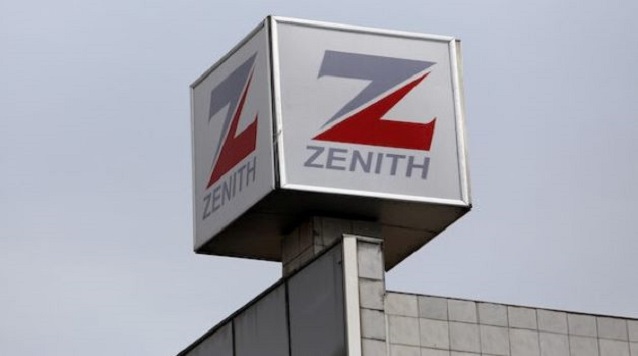E-Financial
Moniepoint Gives Details of How its Redefining Payments in Nigeria with Flexible Options

Moniepoint, a leading fintech company has said that beyond redefining payments and technology and the payment industry, it also ensures that it provides its businesses and partners with several flexible payment options so they can receive payments from their customers.

Moniepoint started with a virtual account service that automated payment or transfer and allowed customers and businesses to make and receive payment seamlessly through transfers.
But speaking during a lead presentation at the inaugural edition of Payments Forum Nigeria (PAFON 1.0) held last week at Oriental Hotel, Lagos, Ikenna Ndugbu, Chief Compliance Officer at Moniepoint said for instance, Monnify, its payment platform, offers a wide variety of payment options to businesses.
Represented by Isoken Aigbomian, the Regional Sales Manager, Moniepoint, Ndugbu said: “There is the online payment platform, there’s the in-person payment option, and then there is the cash payment via our agent network, which I think Moniepoint has the largest agent network.
“We have a wide variety of payment options that we offer to businesses today. Today our online payment options cascade to all sectors, from agriculture to savings to investment. We have several businesses that we currently provide online APIs where they can receive car payment transfers, pay for their phone bills; where customers can process transactions seamlessly via different channels.”
Ndugbu further stated that the bank has its disbursement API that allows businesses to carry out bulk transfers to customers in real-time, seamlessly, without any manual verification required.
“These options that we offer businesses stand us out as a force to reckon with in the payment space today. Monnify, our payment gateway, is among the top three payment platforms for businesses today,” he said.
Explaining further what Moniepoint has brought to the payment space, he said, “When in 2019 we were approached by an organisation that we had recorded for a while, they reached out to us and told us in the payment space they were mainly card processors, they were only processing card transactions.
“And in 2019, if everyone is familiar with the payment space, a lot of customers were very jittery about putting their card skills out there. That was truncating the payment experience, reducing the turnaround time for customers to complete their way, take out this blocker, and have the operation.
“So, what we did was we looked inward and popular means of payment in Nigeria transfer. We worked with our engineers and we’re going to build an infrastructure that automates a notification on transfers.”
Ndugbu said that what this meant was that when the customer makes a payment transfer, the business will not need to manually verify the payment before they can give value.
“So, essentially as a business or as a payment processor, Monnify has the flexibility to incorporate the business’s unique use case and fashion out a service or a payment process that would suit that which is key for business operations,” he said.
Moniepoint’s Micro-Finance Bank (MFB) received its license in February 2022 and has helped over 3 million people and businesses with banking, payment processing, access to loans and business management tools.
It is believed that with these solutions, businesses on the Moniepoint platform process about 8 trillion Naira monthly.
Moniepoint MFB operates the largest distribution network for financial services in Nigeria, and over 33 million people use their cards on its POS terminals monthly across the 774 local government areas in Nigeria.
L-r: Olusola Odediran, Chief Information Security Officer, NIBSS/representative of Chairman, Committee of Chief Information Security Officers of Nigerian Financial Institutions; Chike Onwuegbuchi, co-founder, TechCastle Foundation; Adekunle Ajayi, Product Manager, Cloud and Digital Solutions, inq. Digital Nigeria Ltd; Abidemi Akinola, Chief Compliance Officer, Remita; Efemena Ogie, Head, Partnership, Monipoint Inc., and Peter Oluka, Editor, Techeconomy, during, the Payments Forum Nigeria (PAFON 1.0) event on, ‘Payments: Trust, Security and Privacy in AI era’ held in Lagos recently.
E-Financial
Zenith Bank Gets Regulatory Approval for Full Takeover of Paramount Bank

Zenith Bank, Nigeria’s second biggest lender by market value, has received approval from the Competition Authority of Kenya (CAK) to acquire 100 percent of Paramount Bank Limited, clearing a key regulatory hurdle in its East African expansion drive.

In a statement on Thursday, CAK said the transaction is “unlikely to lead to a substantial prevention or lessening of competition in the market for the provision of banking services in Kenya” and would strengthen Paramount’s financial position, helping it meet enhanced core capital requirements over the long term.
The Kenyan regulator noted that the deal poses no risk of reduced competition in the country’s banking sector. Zenith currently has no banking operations in Kenya, while Paramount is a Tier III lender with a modest 0.2 percent market share.
“The approval is based on the Authority’s determination that the transaction is unlikely to harm competition, while any negative public interest concerns regarding employment can be addressed through mitigating remedies,” CAK added.
Paramount met the Central Bank of Kenya’s KSh3.0 billion core capital requirement in November last year, reporting KSh3.118 billion after raising KSh332 million from shareholders, according to Mwango Capital, a Nairobi-based research firm.
The deal reflects a broader shift among banks in East Africa’s largest economy as lenders seek growth opportunities beyond increasingly saturated home markets marked by weak credit expansion, rising regulatory costs, and intense competition.
While several global banks — including Standard Chartered and HSBC — have scaled back African operations over the past decade, Zenith’s move signals confidence in selective regional expansion, particularly in East Africa, where economic growth and financial inclusion trends remain supportive.
The banking group is also widening its continental footprint. Last month, the lender disclosed plans to expand into Ethiopia, Africa’s second most populous country, as it targets generating up to half of its profits outside Nigeria over the medium term.
Historically, Nigeria, the continent most populous nation contributed as much as 90 percent of the bank’s earnings, a dominance that is now gradually easing.
Data cited by The Africa Report show that profit contributions from foreign subsidiaries rose to 27 percent in the first nine months of 2025, up from 14 percent in 2024.
Nigeria’s banking recapitalisation drive is also pushing large lenders such as Zenith to deploy capital beyond their home market. In January 2025, Zenith — which holds an international banking licence — raised N350.4 billion ($242 million), lifting its paid-up capital to N614.6 billion ($425 million).
With higher capital buffers in place, banks are reassessing how best to deploy fresh funds as domestic earnings normalise following two years of windfall gains.
As part of the approval, Zenith has been required to retain Paramount’s 78 employees for at least 12 months after the transaction is completed.
The bank is listed on the Nigerian and London stock exchanges and operates across corporate, commercial, retail, and investment banking. Its international subsidiaries span the United Kingdom, Ghana, Sierra Leone, Gambia, the UAE, and China.
E-Financial
Court Jails Ogiemwonyi, Stockbroker for Theft of $80,000, N953m Shares Proceeds

Victor Ogiemwonyi, a Lagos stockbroker, and Partnership Securities Limited, his company, have been convicted for allegedly stealing shares worth N953 million and $80,000 belonging to one Mr. Arnold Onyekwere Ekpe, a former managing director of Ecobank Transnational Incorporated (ETI).

Ogiemwonyi was convicted after he was found guilty of two-count charges bordering on stealing, contrary to Section 285(1), (9) (b) and (c) of the Criminal Law of Lagos State, 2011 slammed on him by the Economic and Financial Crimes Commission (EFCC).
Ekpe, through Messrs Margaret Onyema, his counsel, has sometimes in October 2016 in a petition to the EFCC alleged that he instructed the defendants to sell his 96,077,872 units of Ecobank Transnational Incorporated (ETI) shares, which were sold at the rate of N1,296,885,311.02.
But he said out of the proceeds of the sale, the stock broker paid only N300,000,000.00 to him while he dishonestly diverted the balance for personal use.
Following investigations, the defendants were charged with two counts of stealing.
Count one reads:
”Victor Ogiemwonyi and Partnership Securities Limited between the months of June, 2016 and September, 2016 at Lagos within the jurisdiction of this honourable court dishonestly stole the sum of N953, 535,861.57 (Nine Hundred and Fifty Three Million, Five Hundred and Thirty Five Thousand, Eight Hundred and Sixty one Naira Fifty Seven Kobo) being part of the proceeds of sale of 96, 077, 872 Ecobank Transnational Incorporated Shares, property of Mr. Arnold Onyekwere Ekpe”.
Count Two reads:
“Victor Qgiemwonyi and Partnership Securities Limited sometime between June, 2016 and July, 2016 at Lagos within the jurisdiction of this honourable court dishonestly stole the sum of USD$80,000.00 (Eighty Thousand United States of America Dollars) which formed part of the accrued dividends on 96, 077,872 Ecobank Transnational incorporated Shares, property of Mr. Anold Onyekwere Ekpe”.
At trial, the prosecution, led by Ola Sesan, called five witnesses and tendered 67 exhibits, all of which were admitted and marked by the court.
The defence, on its part, called three witnesses, including the first defendant.
Delivering judgment on Wednesday, Justice Modupe Nicole-Clay of the Lagos State High Court sitting in Ikeja, Lagos convicted Ogiemwonyi and his company, Partnership Securities Limited, guilty on all counts.
The court sentenced the first convict to pay a fine of N10 million, while the second convict was ordered to pay a fine of N20 million.
Also, the court directed the convicts to pay back the entire money stolen from the petitioner, both in naira and dollars.
Recall that Securities and Exchange Commission, SEC, had in 2017 banned Victor Ogiemwonyi, from operating in the capital market for life over alleged unprofessional conduct in the Nigerian capital market.
He was also banned for life from holding directorship position in any public company in Nigeria.
He was also ordered to pay a penalty of N100,000.
SEC said Ogiemwonyi was banned after he was found guilty of breaching Rule 1(iii) of the Code of Conduct for Capital Market Operators and Their Employees as contained in its Rules and Regulations made pursuant to the Investments and Securities Act 2007.
The ban also followed petition by EFCC to SEC accusing Ogiewonyi of misappropriation of about N1.24 billion, $80,000.00, stealing and dishonest conversion of proceeds of share sale belonging to an investor.
It was alleged that he used his company to dupe over 300 investors over N4.8 billion with Arnold Ekpe a former Managing Director of Ecobank Transnational Incorporated, ETI, being one of his victims.
E-Financial
FCCPC Delists Non-Compliant Digital Lenders Post-January 5 Deadline

Federal Competition and Consumer Protection Commission (FCCPC) has commenced enforcement actions against Digital Money Lending (DML) operators that failed to regularise their operations under the Digital, Electronic, Online and Non-Traditional Consumer Lending Regulations, 2025 (DEON Regulations).

FCCPC
The commission withdrew the conditionally approved status of non-compliant DML firms and removed them from its official register of approved digital lenders, effective immediately after the January 5 compliance deadline.
FCCPC Executive Vice Chairman and Chief Executive Officer, Mr Tunji Bello, announced the measures on Wednesday, emphasising their role in upholding regulatory standards and ensuring certainty in Nigeria’s digital lending sector.
Mr Bello stated that the compliance window provided under the DEON Regulations, which took effect on July 21, 2025, had closed, paving the way for fair, orderly and due process-driven enforcement.
He noted that the actions target persistent issues such as exploitative loan recovery tactics, data privacy breaches, harassment of borrowers and anti-competitive practices that have plagued the sector.
The DEON Regulations, issued on September 3, 2025, under the Federal Competition and Consumer Protection Act 2018, mandate all non-bank digital lenders to register, adhere to fair interest rates, ethical debt recovery and robust data protection measures.
Non-compliance now attracts severe penalties, including fines up to N100 million or one per cent of annual turnover, operational restrictions, app store delistings and potential director disqualifications for up to five years.
As of late 2025, the FCCPC had granted full approval to 438 digital lending companies, with recent data indicating over 521 firms now under regulatory scrutiny post-deadline.
The commission’s phased crackdown involves collaboration with the Central Bank of Nigeria, Google and Apple for account freezes and global app removals targeting unregistered platforms.
Industry watchers described the enforcement as a landmark move to sanitise Nigeria’s fast-expanding digital credit market, which has seen rising borrower complaints despite earlier 2022 interim guidelines.
The FCCPC reiterated its commitment to balancing innovation with consumer protection, urging affected operators to swiftly meet requirements for reinstatement.

 E-Business3 days ago
E-Business3 days agoFirm Detected a Scam Exploiting OpenAI’s Teamwork Features

 E-Financial3 days ago
E-Financial3 days agoMoMo PSB Expands Cross-Border Transfers Across Africa

 Broadcasting3 days ago
Broadcasting3 days agoDG NCC Tasks University Dons on Research Commercialization, IP Management to Build Global Competitive Ecosystems

 E-Financial3 days ago
E-Financial3 days agoBanks to Cut Fraud Response Times to Under 30 Minutes

 Telecom3 days ago
Telecom3 days agoFG Expands 3MTT Programme Across the Country

 News3 days ago
News3 days agoFirms Face Gaps Between AI Ambition and Execution

 Telecom3 days ago
Telecom3 days agoMTN Foundation Trains 2,000+ Young Nigerians in ICT for SME Growth

 E-Financial1 day ago
E-Financial1 day agoZenith Bank Gets Regulatory Approval for Full Takeover of Paramount Bank

























